Ever felt like you’re stuck in a never-ending tug of war? We’ve all been there, trying to get the best deal but feeling like we’re just spinning our wheels. But don’t worry, it doesn’t have to be this way.
We’ve picked out 7 awesome books that are going to be your new go-to guides. These books are like treasure troves, filled to the brim with smart tactics, strategies, and insights about negotiation. They’re chock-full of practical tips, clever tricks, and fresh ideas that will help you negotiate like a pro and get what you want.
So, whether you’re a business bigwig working on a huge deal, a professional trying to navigate office politics, or just someone trying to snag a bargain, these books are perfect for you. They’re full of techniques that are not only super effective but also easy to put into action, which is what Book Butter Club is all about, Act Upon Your Knowledge.
So, get ready to step up your negotiation game!
1. Supercommunicators by Charles Duhigg
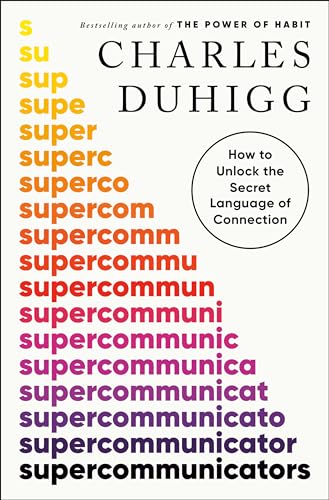
“Supercommunicators: How to Unlock the Secret Language of Connection” by Charles Duhigg is a fascinating exploration of what makes conversations work and how we can all learn to be supercommunicators at work and in life.
In this groundbreaking book, Duhigg blends deep research and his trademark storytelling skills to show how we can all learn to identify and leverage the hidden layers that lurk beneath every conversation. He argues that communication is a superpower and the best communicators understand that whenever we speak, we’re actually participating in one of three conversations: practical (What’s this really about?), emotional (How do we feel?), and social (Who are we?).
Duhigg provides specific techniques and approaches, offering practical strategies to improve communication. This book is a valuable resource for anyone seeking to enhance their communication skills. It takes readers from the writers’ room of The Big Bang Theory to the couches of leading marriage counselors, showing readers how to recognize these three conversations and teaching us the tips and skills we need to navigate them more successfully.
The book is packed with fascinating case studies and draws on cutting-edge research. It will change the way you think about what you say, and how you say it. Whether you’re a professional looking to communicate more effectively or someone interested in improving your everyday conversations, “Supercommunicators” offers valuable insights and practical advice.
Check out a free book summary here.
2. Getting to Yes Roger Fisher
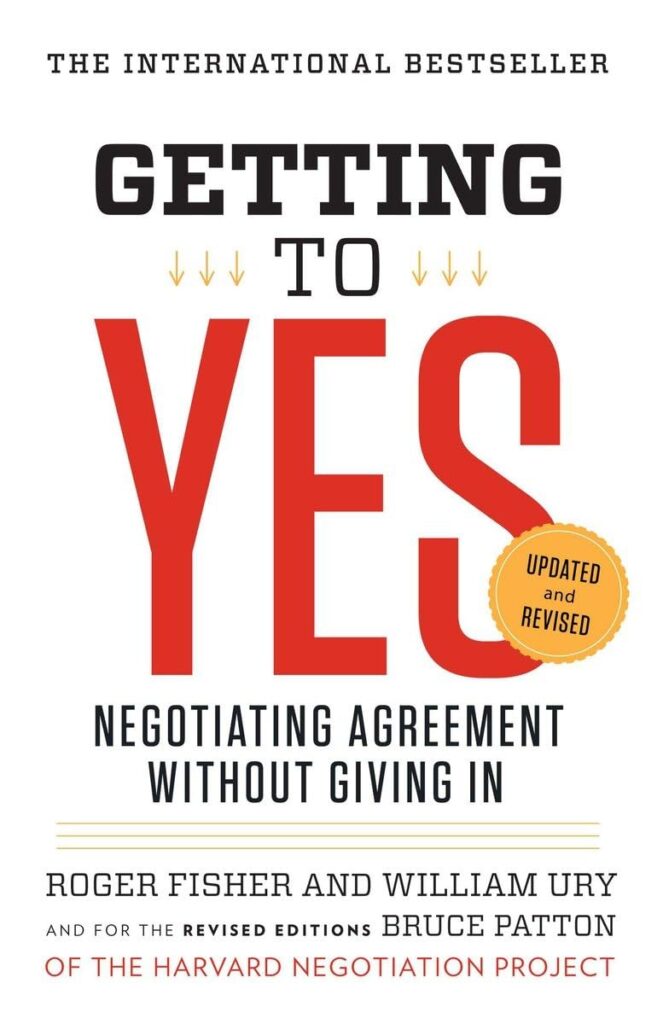
“Getting to Yes: Negotiating Agreement Without Giving In” by Roger Fisher, William L. Ury, and Bruce Patton is a seminal book in the field of negotiation. It offers a step-by-step strategy for coming to mutually acceptable agreements in every sort of conflict.
The book is based on the work of the Harvard Negotiation Project, a group that deals with all levels of negotiation and conflict resolution. The authors propose a method called “principled negotiation” or “negotiation of merits”, which is based on four main points:
- Separate the people from the problem: This principle emphasizes the importance of addressing the problem at hand and not the individuals involved, thereby preventing emotions from influencing the negotiation process.
- Focus on interests, not positions: The authors suggest that negotiators should concentrate on the interests behind the position each party holds. By understanding the interests, negotiators can find mutually beneficial solutions.
- Invent options for mutual gain: This principle encourages brainstorming and thinking creatively to find solutions that can benefit both parties.
- Insist on using objective criteria: The authors recommend basing the agreement on objective standards or criteria to ensure fairness.
The book is thoroughly updated and revised, offering readers a straightforward, universally applicable method for negotiating personal and professional disputes without getting angry or feeling taken advantage of. It has helped millions of people learn a better way to negotiate and is considered one of the primary business texts of the modern era.
3. Never Split the Difference by Chris Voss
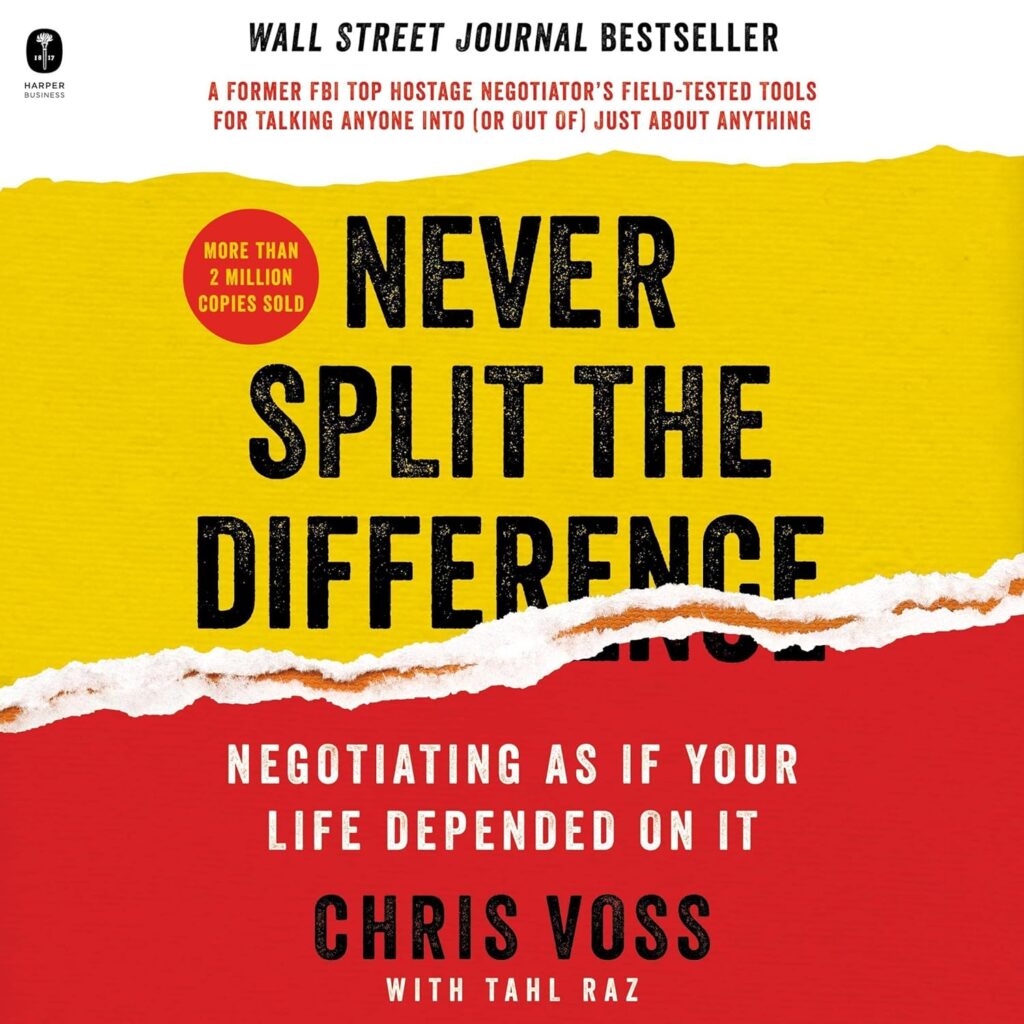
“Never Split the Difference: Negotiating As If Your Life Depended On It” by Chris Voss and Tahl Raz is a highly influential book in the field of negotiation. Chris Voss, the author, is a former FBI hostage negotiator, and in this book, he reveals the high-stakes negotiation tactics that he used during his career.
The book provides a gripping, behind-the-scenes recounting of dramatic scenarios, from the gang-infested streets of Haiti to a Brooklyn bank robbery gone horribly wrong. These real-life stories serve as a backdrop for the negotiation strategies that Voss and his colleagues used to succeed where it mattered most: saving lives.
Voss introduces a series of principles and tactics that anyone can use to become more persuasive in both their professional and personal lives. These include learning how to use empathy and other emotional intelligence skills to change your counterpart’s mind, how to negotiate without giving in, and how to use the ‘Ackerman Model’ for effective bargaining.
One of the key messages of the book is that negotiation is not a zero-sum game where one party has to lose for the other to win. Instead, Voss advocates for a collaborative approach where both parties can leave the negotiation feeling satisfied.
Whether you’re negotiating a salary, buying a car, or even dealing with personal relationships, the techniques in “Never Split the Difference” offer valuable insights that can help you navigate any negotiation scenario. The book is not just for professionals or business people – anyone can apply these techniques in their daily life to achieve their goals and resolve conflicts.
4. Bargaining for Advantage by G. Richard Shell
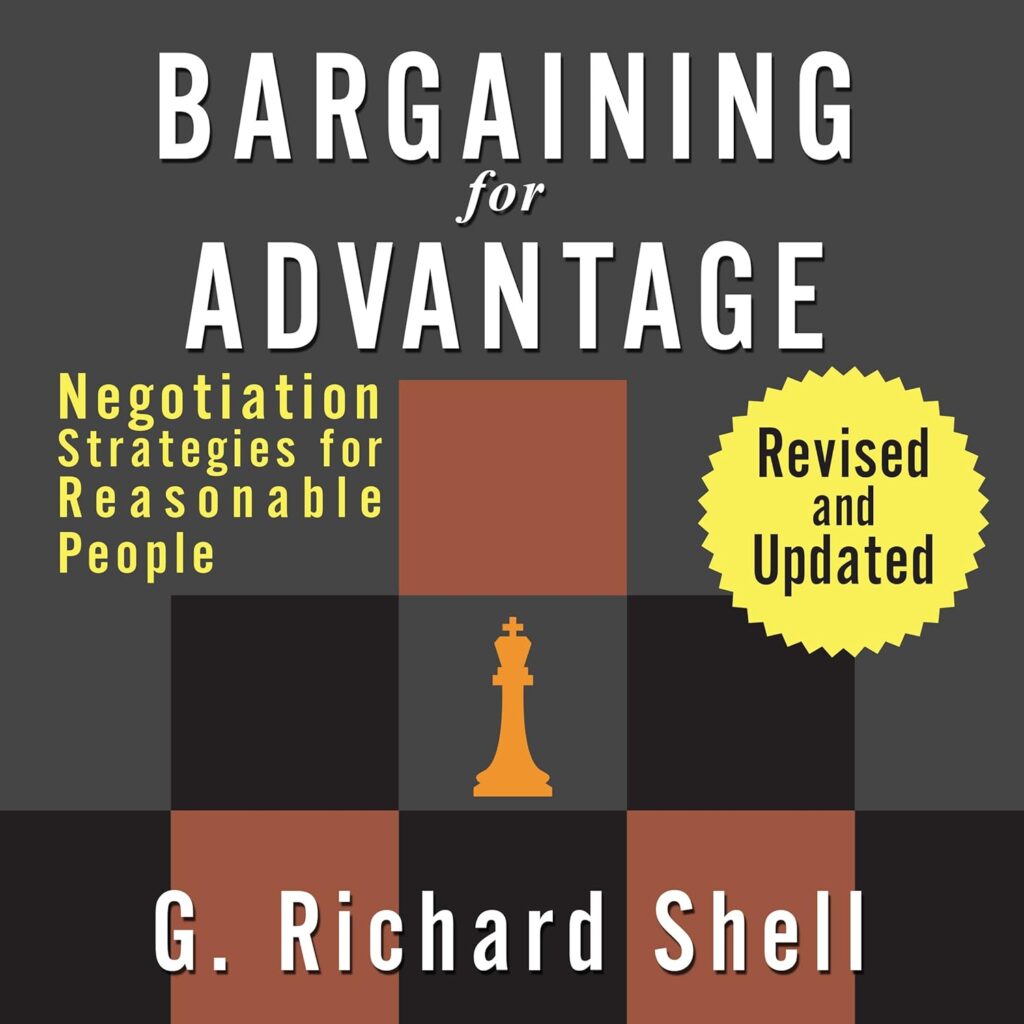
“Bargaining for Advantage: Negotiation Strategies for Reasonable People” by G. Richard Shell is a comprehensive guide to the complex world of negotiation. The book provides a step-by-step approach to effective negotiation, combining lively storytelling, useful lessons gleaned from the tactics used by some of the world’s leading business strategists, and the latest insights from negotiation research.
The book is based on Shell’s experiences as the director of the renowned Wharton Executive Negotiation Workshop, where he has taught thousands of business leaders, lawyers, administrators, and other professionals how to survive and thrive in the world of negotiation.
Shell introduces six foundations of effective negotiation: your bargaining style, your goals and expectations, authoritative standards and norms, relationships, the other party’s interests, and leverage. He then outlines a four-step negotiation process: preparing your strategy, exchanging information, opening and making concessions, and closing and gaining commitment.
One of the unique features of the book is its focus on ethics in negotiation, with a chapter titled “Bargaining with the Devil Without Losing Your Soul”. The book concludes with a discussion on how to become an effective negotiator.
“Bargaining for Advantage” is a valuable resource for anyone looking to improve their negotiation skills, whether they are negotiating a business deal, resolving a dispute, or simply trying to get a better deal on a purchase. It offers practical advice and strategies that can be applied in any negotiation situation.
5. Negotiating at Work by Deborah M. Kolb and Jessica L. Porter
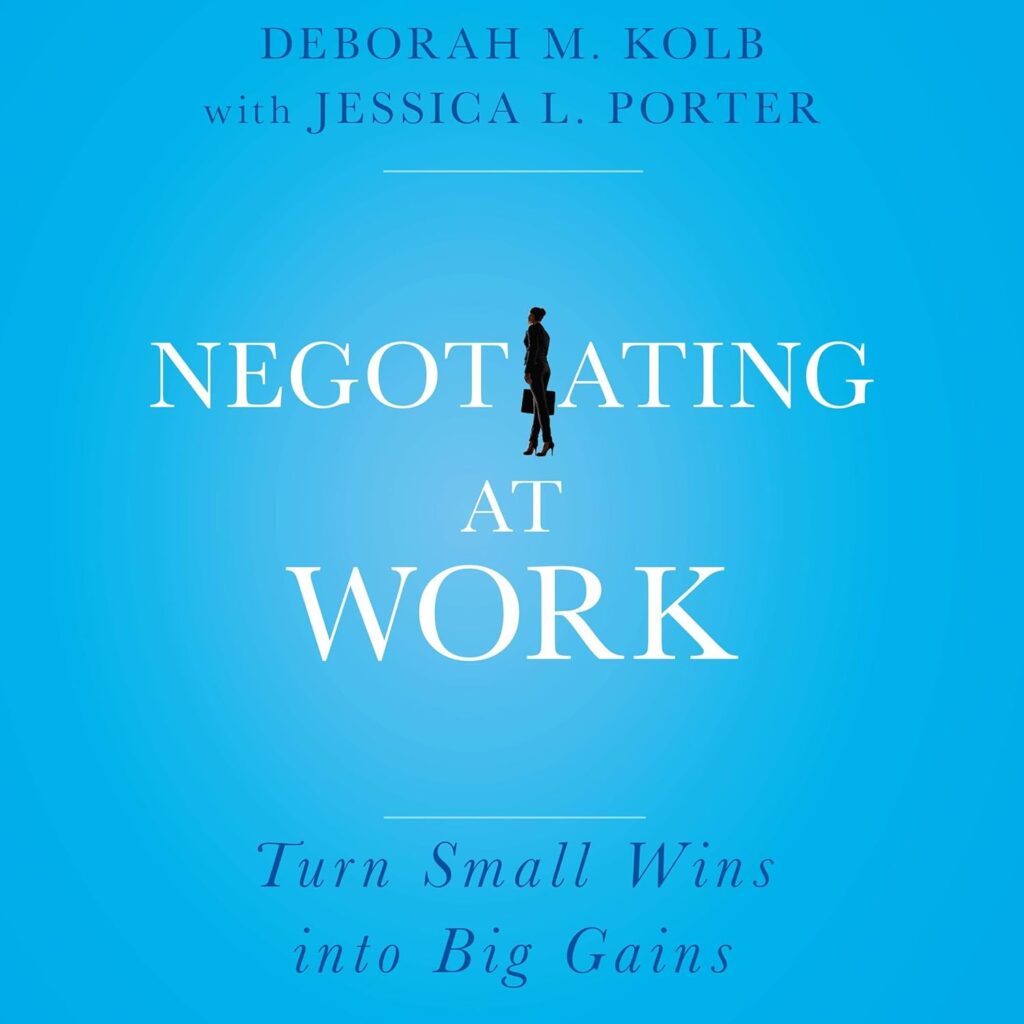
“Negotiating at Work: Turn Small Wins into Big Gains” by Deborah M. Kolb and Jessica L. Porter is a practical guide that offers strategies for managing your own workplace negotiations. The book emphasizes how to get opportunities, promotions, flexibility, buy-in, support, and credit for your work.
The authors highlight that negotiations in the workplace do not occur in a vacuum. They are deeply influenced by the context of organizational dynamics. Recognizing that negotiating with someone who has more power adds a level of complexity, the book provides strategies to navigate these dynamics effectively.
The book encourages readers to challenge the status quo and negotiate for new opportunities or increased flexibility. By doing so, individuals can create small wins that can grow into something bigger, both for themselves and their organizations. In this way, negotiation becomes a tool for addressing ineffective practices and outdated assumptions, and for creating change.
The authors also provide strategies to get the other person to the table and engage in creative problem solving, even when they are reluctant to do so. They offer tips on how to recognize opportunities to negotiate, bolster your confidence prior to the negotiation, turn ‘asks’ into a negotiation, and advance negotiations that get “stuck”.
The book is rooted in real-life cases of professionals from a wide range of industries and organizations, both national and international. It provides a rich examination of research on negotiation, conflict management, and gender. By using these strategies, you can negotiate successfully for your job and your career; in a larger field, you can also alter organizational practices and policies that impact others.
6. Better, Not Perfect by Max H. Bazerman
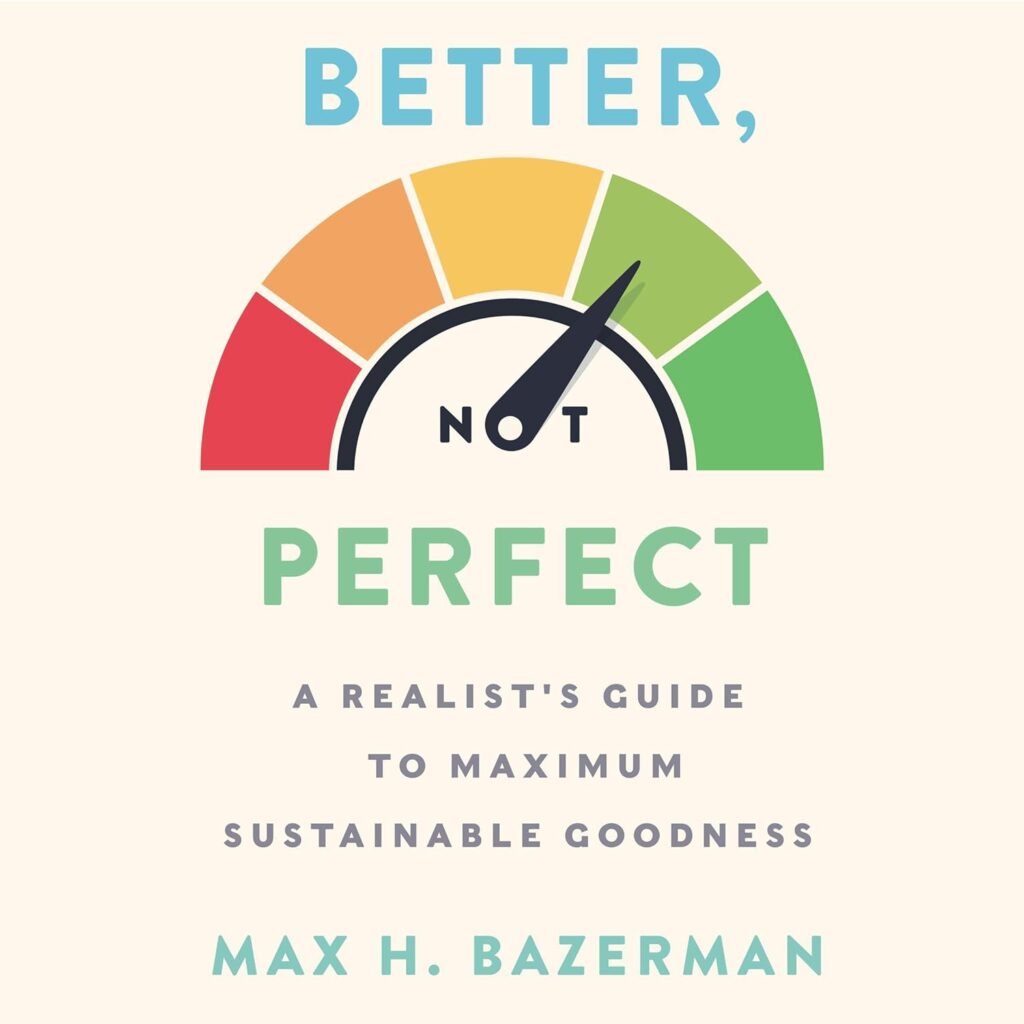
“Better, Not Perfect: A Realist’s Guide to Maximum Sustainable Goodness” by Max H. Bazerman is a thought-provoking book that explores how we can make better, more principled choices in our lives. Bazerman argues that we can better balance both dimensions of decision-making—maximizing our pleasure and minimizing pain—and we needn’t seek perfection to make a real difference for ourselves and the world.
The book provides a deeply researched, prescriptive roadmap for achieving what Bazerman calls “maximum sustainable goodness.” This concept refers to the idea of making decisions that not only benefit us personally but also have a positive impact on the world around us.
The book is divided into three parts. In Part One, Bazerman shares a framework to be smarter and more efficient, honest, and aware. In Part Two, he identifies four training grounds to practice these newfound skills for outsized impact: how you think about equality and your tribe(s); waste—from garbage to corporate excess; the way you spend time; and your approach to giving—whether your attention or your money.
In Part Three, Bazerman trains your eye on how to extend what you’ve learned and positively influence others. The book melds philosophy and psychology as never before, providing a down-to-earth guide that will help clarify your goals, assist you in doing more good with your limited time on the planet, and see greater satisfaction in the process.
Overall, “Better, Not Perfect” is a compelling read for anyone interested in improving their decision-making skills and making a positive impact on the world.
7. 3D Negotiation by David A. Lax and James K. Sebenius
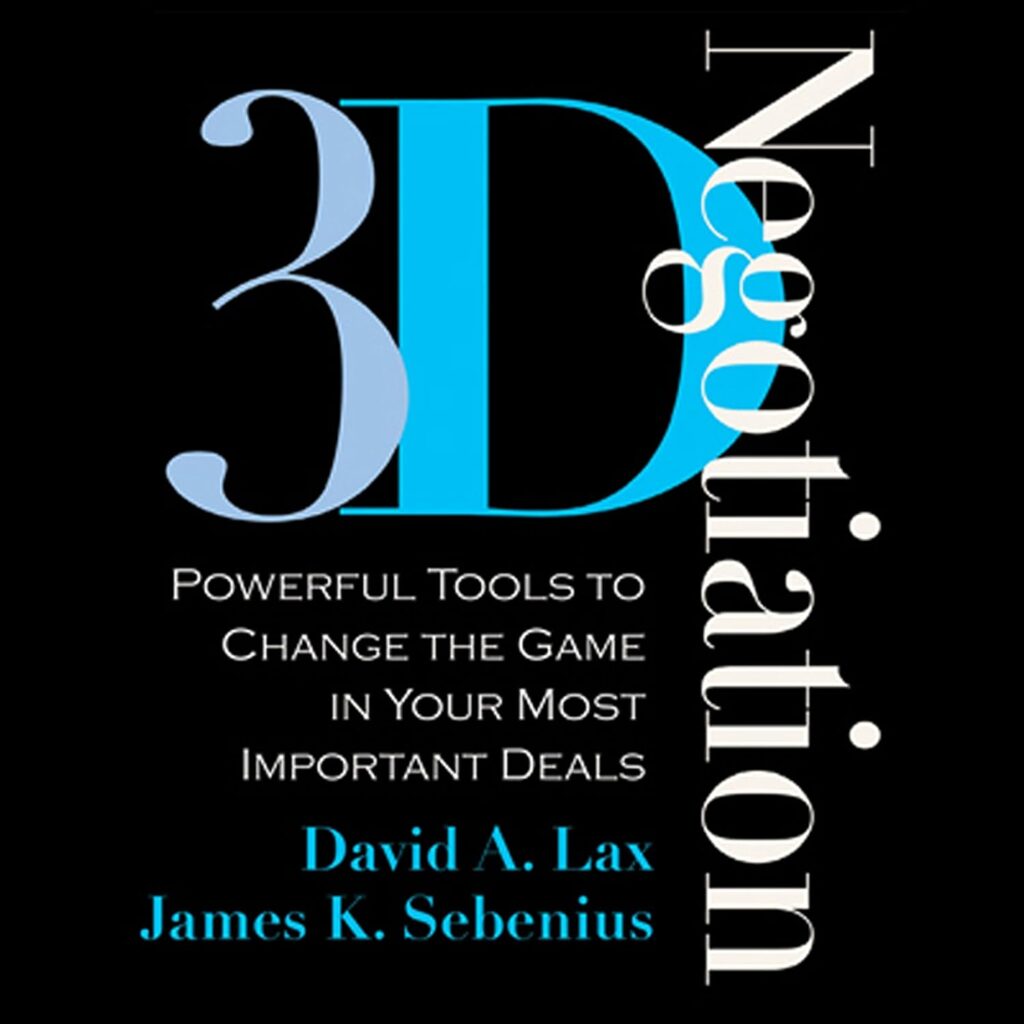
“3D Negotiation: Powerful Tools to Change the Game in Your Most Important Deals” by David A. Lax and James K. Sebenius is a groundbreaking book that offers a fresh perspective on negotiation. The authors argue that successful negotiation doesn’t just rely on the tactics at the bargaining table, but also on the more complex set-up and deal design stages.
The book introduces a three-dimensional approach to negotiation, which includes tactics, deal design, and set-up. The authors argue that most negotiators focus too much on the first dimension—tactics—while neglecting the other two dimensions. They suggest that the key to success lies in balancing all three dimensions.
In the first dimension, the authors discuss traditional negotiation tactics used at the bargaining table. In the second dimension, they explore deal design, which involves creating agreements that unlock economic and non-economic value. The third dimension, set-up, involves ensuring that the right parties have been approached, in the right sequence, to address the right interests, under the right expectations, and facing the right consequences of walking away if there is no deal.
The authors provide practical steps and cases to demonstrate how superior set-up moves, combined with insightful deal designs, can enable you to reach remarkable agreements at the table, unattainable by standard tactics. The book is packed with practical advice and is designed to help readers change the game in their most important deals.
Overall, “3D Negotiation” is a valuable resource for anyone involved in negotiations, whether in business, diplomacy, or everyday life. It provides readers with the tools they need to become more effective negotiators and to achieve better outcomes in their negotiations.
You Might Also Like:
- 8 Books to Skyrocket Your Productivity (With Short Summaries)
- 7 Banned Books You Shouldn’t Read and Here’s Why
- 5 Books That Will Teach You High-Income Skills in 2024
- 13 Pieces of Advice From Adam Grant, From His New Best Seller Book
- Book Summary: “The Creative Act” by Rick Rubin
- Book Summary of “The Story of B,” by Daniel Quinn